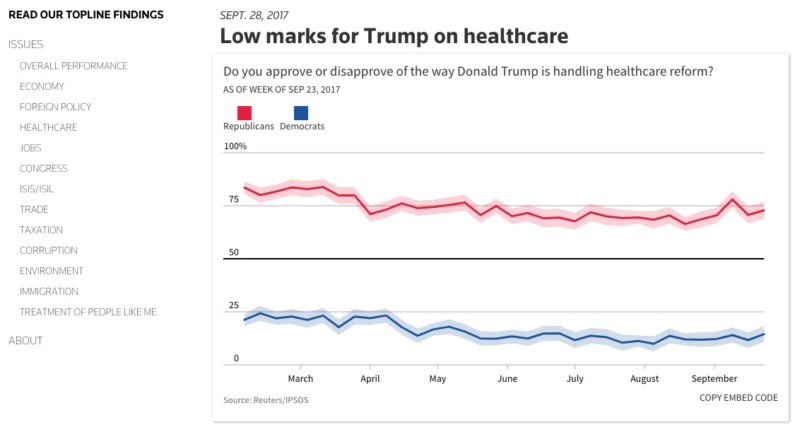The Trump administration has become known for distraction and misdirection. The moment the president introduces a complicated executive order or policy, he’ll send media and public attention scrambling after a tweet, insult, or shot across the bow of America’s deepening culture war.
Reuters is hoping to drag readers’ attention back to what happens after the president’s word becomes law. Its new multimedia offering “The Trump Effect,” which launched today as a permanent addition to Reuters’s online presence, aims to track the consequences of administration policies—with interactive graphics, a news archive, and opinion polls.

“We were concerned, like many people are, about how much noise is out there, and how much of what passes for news is arguments and counterarguments, or shouting matches,” says Steve Adler, editor in chief at Reuters. “Whether you like or don’t like the impact of something, we want to make sure you don’t get distracted—that you can see for yourself what the impact is, and decide for yourself how you feel about it.” (Editor’s note: Adler chairs CJR’s Board of Overseers.)
ICYMI: “I’ve never seen lying and obstruction like this.”
Reuters is far from the first news organization to try and turn heads back toward the impact of Trump’s policies. Bloomberg, for example, keeps a fine-grain categorized database of its Trump coverage, while outlets like National Geographic and Education Week have built specialized portals around environmental regulations and school visits, respectively. Earlier this month, USA Today launched an interactive guide to the entire US-Mexico border, based on a similar instinct that “people want to see facts for themselves.”
Reuters’s effort, helmed by US National Affairs Editor Jason Szep, will attempt to show the impact of policy on the public across all parts of government—though the rollout will be limited to four topics: energy and the environment, health care, immigration, and business and the economy.
Even in its early iteration, the project is an ambitious undertaking, especially as it won’t be siloed away as a separate project with a dedicated staff. “The 30 or so people working on this are the people working on those beats,” Adler says. “It changes, in some ways, our entire reporting strategy toward covering the administration.”
In addition to giving readers more information on the impact of Trump’s policies, The Trump Effect will use polling data to track how Americans perceive that impact.

Reg Chua, Reuters’s data and innovation editor, accepts that polls don’t always capture people’s true feelings about policies that affect them. “If you put out a statement and ask people if they agree or disagree with it, the results change markedly if you say ‘this statement,’ [versus] ‘this statement President Trump made,’” he says.
But Chua says the inclusion of polls alongside policy coverage will at least show broad changes in public sentiment over time. “It lets you get a sense of what the pulse of the country is on specific questions as [policy] effects take hold,” he says.
While it will track opinion as part of its mission, Adler stresses that The Trump Effect’s content will be nonpartisan. Evidenced reporting on policy outcomes is hardly a fail-safe against Trump’s wrath. But Reuters has so far escaped the contempt the president has rained on some of its competitors.
“We’re not focusing specifically on, ‘Is the president breaking his promises?’ We’re not focusing specifically on, ‘How many times does the president not tell the truth?’” Adler says. “There’s no contentiousness to it. It’s entirely about providing useful information on areas of impact.”
Jon Allsop is a freelance journalist whose work has appeared in the New York Review of Books, Foreign Policy, and The Nation, among other outlets. He writes CJR’s newsletter The Media Today. Find him on Twitter @Jon_Allsop.

